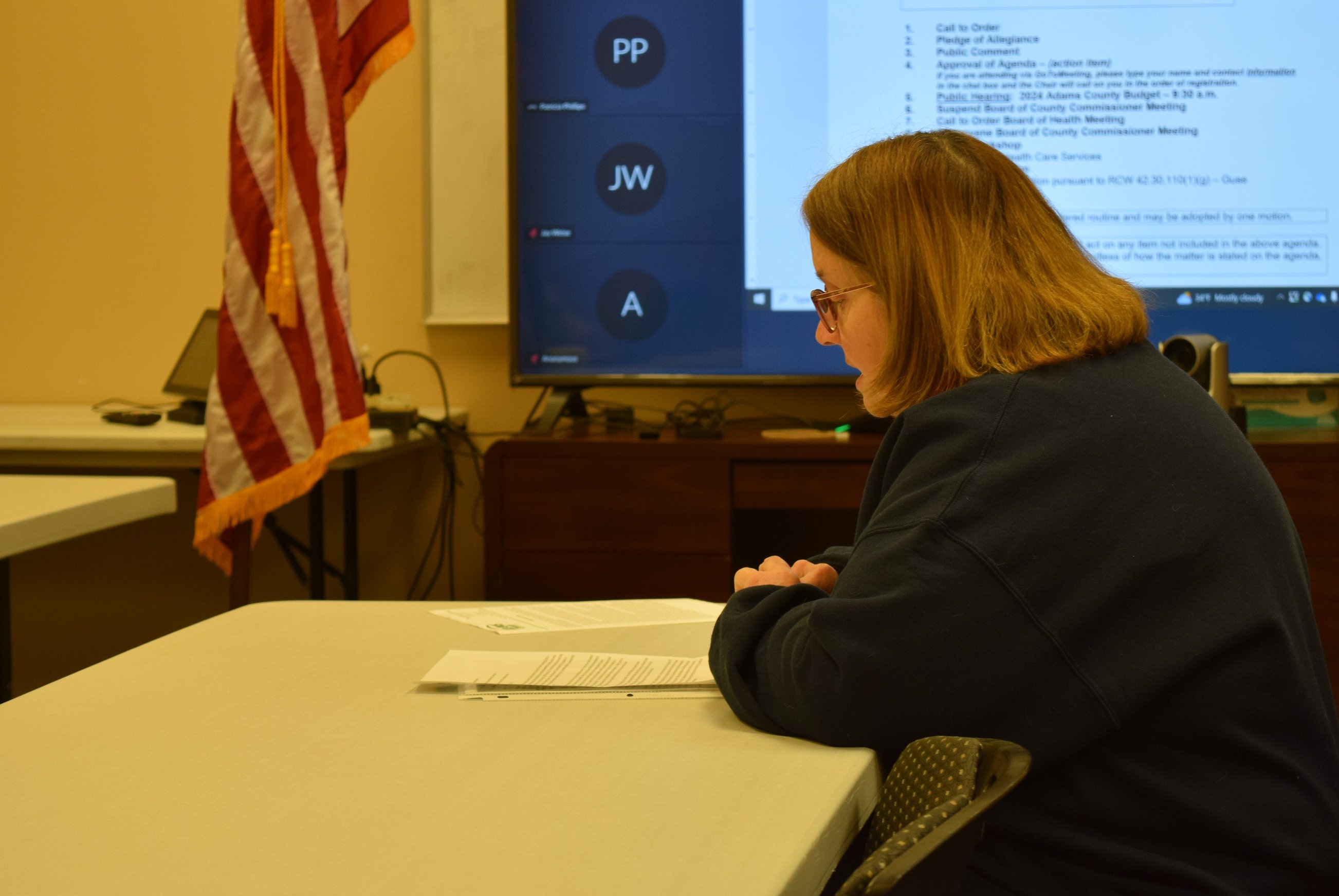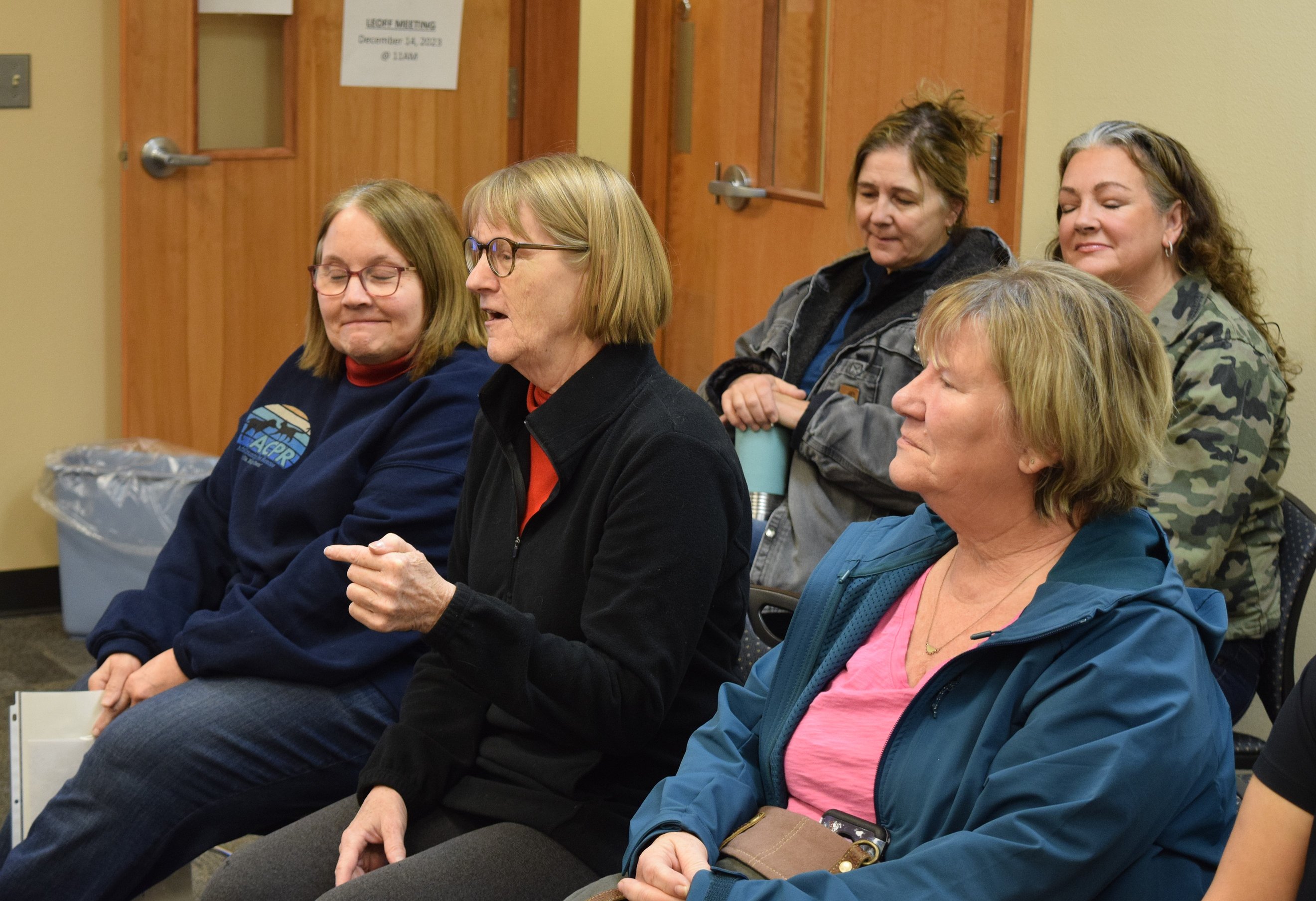Adams commissioners address ACPR funding
GABRIEL DAVIS | Hagadone News Network | UPDATED 1 year, 7 months AGO
Gabriel Davis is a resident of Othello who enjoys the connections with his sources. Davis is a graduate of Northwest Nazarene University where he studied English and creative writing. During his free time, he enjoys reading, TV, movies and games – anything with a good story, though he has a preference for science fiction and crime. He covers the communities on the south end of Grant County and in Adams County. | December 14, 2023 4:59 PM
OTHELLO — Several members of the public gathered at the Adams County District Court in Othello to provide public input regarding Adams County Pet Rescue’s request for increased funding, which the commissioners responded to later in the meeting.
ACPR currently contracts with the county for a sum of about $60,000 and is requesting that number be increased to $150,000, according to ACPR board member Tammy Foley, who was the first to speak during the public comment.
“Adams County Pet Rescue picked up 570 dogs, either through animal control or brought in by residents in Adams County. We also had over 200 cats brought in by residents of Adams County or picked up through our animal control,” Foley said. “The cost of sheltering dogs for the county is costing us $600,000 annually. For years, we have had to absorb this additional cost of sheltering county animals. We can't do it any longer and we’ll be forced into closing our doors.”
Michelle Inserra, president of Friends of Tri-Cities Animal Shelter and the founder of the Southeastern Washington Coalition for Animals, wrote a letter to the county in support of the ACPR.
“Adams County Pet Rescue is essential to your community’s responsibility to humanely care for abandoned, abused and surrendered cats and dogs,” Inserra said. “If they were to close due to the lack of funds necessary to operate the shelter this will negatively impact all other southeastern Washington shelters and rescues, which are all currently over capacity as well. Please be part of the solution to this shelter crisis by providing funds necessary for operations of this much-needed shelter.”
ACPR Volunteer Kim Bailey added her input.
“I can't figure out anything that we're doing that we could do better,” Bailey said. “I’m just hoping that you would be able to give the funding that the rescue is asking for, because if we can't support it financially and we have to get our numbers down, then there's only one way to get the numbers down, which is leave the dogs in the county, not picked up.”
Community member Kimmy Sanders also commented.
“Wouldn't it be wonderful if Adams County set a precedent for everybody else in the country? Wouldn't be wonderful if we put both Othello and Adams County on the map as being the first county and city to do something positive to help these animals,” she said.
Othello resident Dale Wyman offered a different perspective.
“I'm not against. So, don't misunderstand what I'm saying. Pet rescue has a purpose, and they do a great job,” Wyman said. “But they need to look at the future of where they're going. The animals keep growing and the intake keeps getting bigger. So, how are you going to eliminate that cost (that is) escalating?”
The commissioners allowed Foley to respond to Wyman.
“Honestly if we had $150,000 to fund Pet Rescue, we would have more money for free spay and neuter clinics. That's the answer, to get these dogs spayed and neutered and let people know ‘don’t breed your dog,’” Foley said. “I agree we have a problem but we're hoping to get the funding, so we can do more spaying and neutering. Kim (Bailey) and I are going in the schools trying to do more education because Dale is right, it's like where does this end? We can't have 1000 dogs out there. I agree. I totally agree. For Christmas, everyone in this room should find someone with an unaltered dog and they should pay for that dog to be spayed or neutered. That would be the most wonderful thing you could do.”
Commissioner Jay R. Weise addressed the matter after Foley asked if the commissioners had considered providing more funding to the ACPR.
“Everything you said we thought about. We thought about keeping you right where you're at. We thought about how can we give you more,” Weise said. “We thought about all of those things. And what we wanted to make sure is that people also understand that that's what we're dealing with and what our budget is and we have the same problem that your organization has, how do you stretch your dollar out and continue to provide the service that you're supposed to provide.”
Weise said the initial 2024 expenditure requests for the county’s departments and funds are about $2 million more than projected revenues, and the county has been working to try and balance the budget.
Commissioner Dan Blankenship added context to the list of requested expenditures, which totaled about $13.5 million.
“That list of things up there at the top looks like, ‘Well, looks to me like you’ve got about $13.5 million of spending requests, you ought to be able to move that money around to do other things.’ Almost everything on that list are things we are statutorily required to do,” Blankenship said. “So, while it looks like there's a lot of flexibility in there and we've got all this authority and power to move money around, the amount of money in there that we can actually move around is pretty small.”
Commissioner Mike Garza added that there are many state programs the county is required to enact without any additional funding for those programs. Additionally, he said the commissioners have discussed ACPR’s situation very thoroughly.
“I have found out in my short tenure here that it is very different and it is a lot more restricted than other places have been. So, it's hard,” Garza said. “This is my first budget, and I'm breaking out because all I think about at night is how do I do these things? How do we keep the company afloat ... We're doing everything within our power to try to accommodate, and … try to help everyone as much as we can.”
Weise elaborated on the problems with managing the county’s budget, saying they receive funding requests from many other organizations as well, such as food banks or senior centers, and have to consider the county’s own departments.
“I don’t want to seem like I’m giving you lip service, because those things have been discussed numerous times, how do we do that?” he said. “Unfortunately, almost everything that we come up with isn't a fix today. It may be a fix later on.”
Gabriel Davis may be reached at gdavis@columbiabasinherald.com. Davis lives in Othello and covers Adams County, Othello, Warden and Mattawa.
MORE STORIES

Othello earmarks additional $50,000 for ACPR in preliminary budget
Columbia Basin Herald | Updated 1 year, 8 months ago
ARTICLES BY GABRIEL DAVIS

Work-based learning lets students build their own futures
MOSES LAKE — Work-based learning provides education opportunities for the workforce to receive hands-on training and technical education and prepare themselves to enter various industries. Educators and workforce development professionals from Eastern Washington discussed some the training they offer and the benefits of their programs. Next Generation Zone, an affiliate of WorkSource based in Spokane, provides job training opportunities for youth and young adults ages 16 to 24. Program Coordinator Kate Martin said there are multiple benefits to the program. “One of them is a paid work experience, and that’s where we reach out to area employers who are willing to take a young person and train them,” she said. “This is a short-term learning experience, so it’s typically about 240 hours; sometimes it could be longer or shorter. We’re the actual employer; we cover all of their wages, taxes, the L&I, and the employer just agrees to give them the experience and train them in whatever field it is that they’re wanting to go into.”

Serving schools: ESD superintendents reflect on operations, priorities
MOSES LAKE — Educational service districts are government-mandated agencies put in place to provide services to school districts across the state. ESD Superintendents discussed what they do and their priorities in operating their districts. ESD 105, led by Superintendent Kevin Chase, serves four counties, including Kittitas, Yakima and portions of Klickitat and Grant counties and provides support for 25 school districts – including Royal School District and Wahluke School District – and more than 66,000 students. “We help them collaborate with each other as well or collaborate with other partners,” Chase said. “(It’s) a lot of advocacy work, either regionally or across the state, or even federally, working on different issues that impact our education. And we provide very specialized services in certain situations in order to meet the needs of our students in our region and of our school districts.”

Columbia Basin Project making headway through Odessa Groundwater program
CASHMERE — The Columbia Basin Project is making gradual progress toward completion with particularly significant accomplishments for the Odessa Groundwater Replacement Program in the last six months or so, according to Columbia Basin Development League Executive Director Sara Higgins. “When we’re dealing with a project of this size, advancement is kind of like watching paint dry, but yes, there have been (developments),” she said. “There are a lot of exciting things happening right now.” There are more than 300 miles of main canals, about 2,000 miles of lateral canals and 3,500 miles of drains and wasteways in the irrigation project, according to the U.S. Bureau of Reclamation website. The CBDL advocates for the operation of those waterways and for the project to continue “build-out.”







